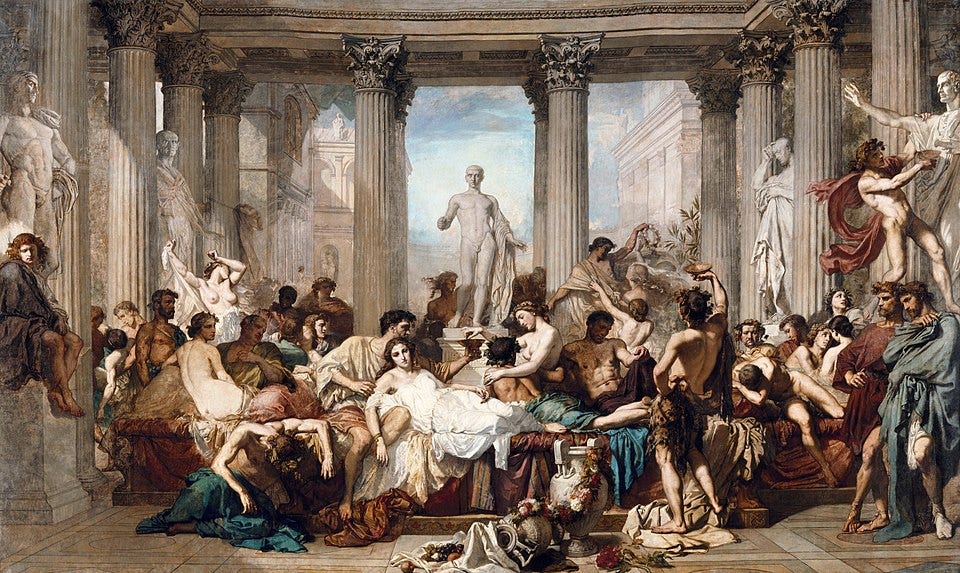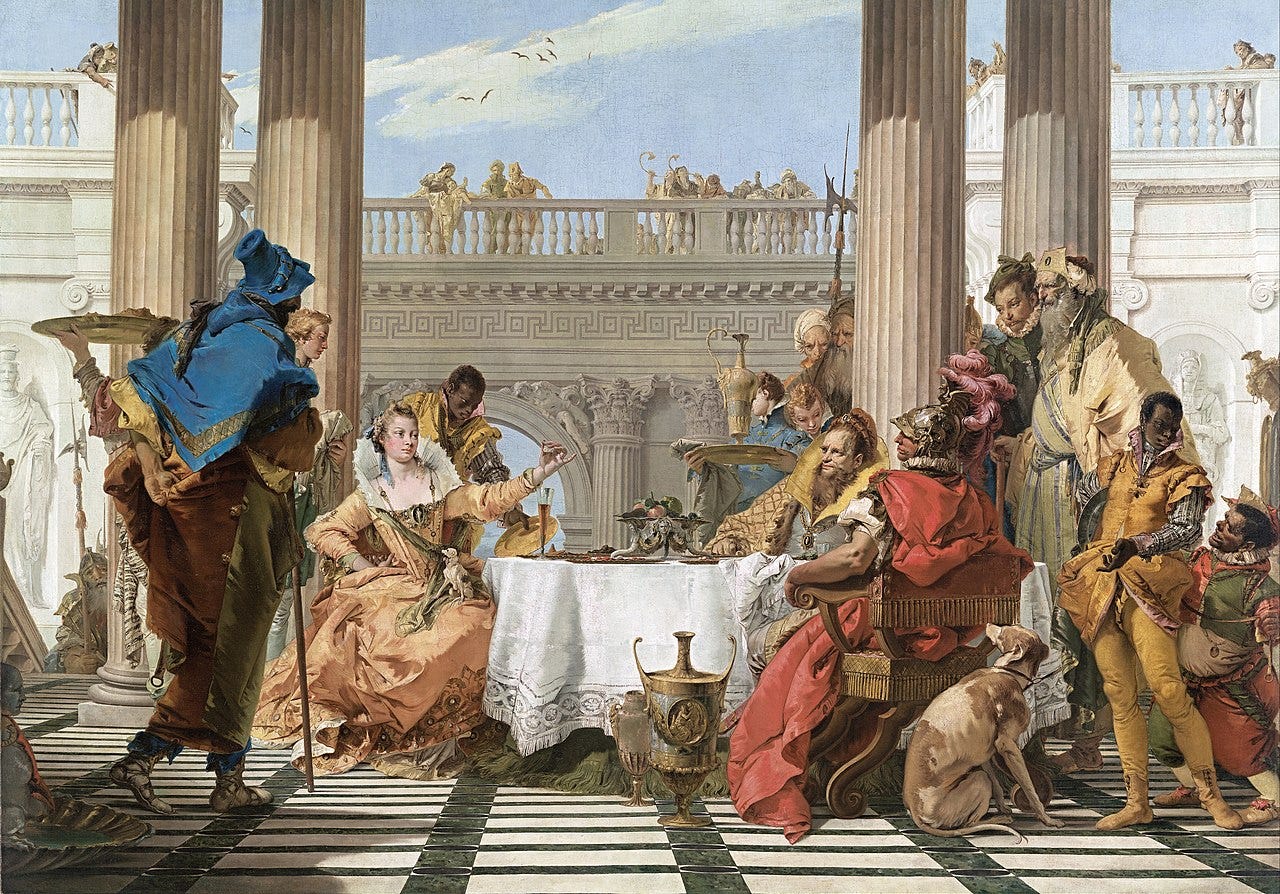May — ὕβρις
"May came too soon, and suddenly unable to bear walls, he wandered the campus at all hours through starlight and rain."
Writer’s Note: My sincerest apologies for the three day delay, I was struck with illness and cursed with a lack of wi-fi.
Okay. I am going to suggest something controversial: British baked beans are not as bad as they look. Outside of the hash browns, they might even be the best part of the meal. Sans the nasty British ham that they call “bacon,” I firmly believe that English Breakfast is, against my American prejudice, surprisingly solid.
Now, some of you may perceive this as a sign of my moral decline: has Adam truly lost it all? But shush. I have been coming around to England in the last few months. Hell, I might even go as far as to say that I have been enjoying my time in Britain. Yes, British food is bland and looks like Shrek has vomited on your plate. Yes, the weather is horrible. Yes, everything is damp. Yes, British houses are badly proportioned. Yes, British spaces are poorly insulated. Yes, British people have terrible teeth. Yes, everything is falling apart.
All of these accusations and more—they are all true.
Don’t believe me? Here is what Isean had to say about my apartment:
The ceilings were low and the ground creaked, the bathroom door stuck to itself and failed to lock, the bathroom sink only issued cold water and the shower curtain didn’t fully wrap around the tub. Everything was at a strange angle: the bathroom ceiling was pitched–not over the toilet where this would’ve been logical, but instead over the shower. This made showering difficult—because of the roof’s angle, you either hit your head against the ceiling, or you leaned into the moldy shower curtain.
To take another note from Isean’s manuscript (even though I showed this passage to him first), the Roman historian Cassius Dio once wrote a delightful description of Britain and its native people in Book LXXVII of his Roman History:
There are two principal races of the Britons, the Caledonians and the Maeatae, and the names of the others have been merged in these two… Both tribes inhabit wild and waterless mountains and desolate and swampy plains, and possess neither walls, cities, nor tilled fields, but live on their flocks, wild game, and certain fruits; for they do not touch the fish which are there found in immense and inexhaustible quantities. They dwell in tents, naked and unshod, possess their women in common, and in common rear all the offspring… They can endure hunger and cold and any kind of hardship; for they plunge into the swamps and exist there for many days with only their heads above water, and in the forests they support themselves upon bark and roots, and for all emergencies they prepare a certain kind of food, the eating of a small portion of which, the size of a bean, prevents them from feeling either hunger or thirst.
(Roman History, Book LXXVII, Chapter XII)
Not much has changed since the days of the Roman Empire, so it appears. There is a reason that Hobbes described life as “solitary, poor, nasty, brutish, and short.” Life in in 1600s England will do that and worse to a man.
I jest, of course, for there are redeeming qualities. To justify the plural use of “qualities,” I shall identify at least three.
First, there is Natural Beauty and Grace in England. The Lake District, the Cotswold, the Peak District, and so on. While the people here aren’t exactly lookers, the British countryside in general is quaint and cute. It turns out millions of people visit England for a reason, really makes you think.
Second, most British museums are free, which almost makes up for the fact that it costs an arm and a leg to see anything else in this country. Free admission into several world-class museums makes traveling to London significantly more attractive. (What's that? This fact only pertains to London? What about the rest of the country? The British stole all the stuff anyway? And this joke is 300 years old? Look man. What do you want from me. Nothing in England is outside of a drivable distance. If you live in England but never travel to London, what's wrong with you? There is nothing to do in like 90 percent of the country, especially if you live in the Midlands. And don't try to defend England by telling me about some random hamlet you call a "city" named Bloke-upon-Stench or something absurd. Just go check out the National Galleries and Tate Britain in London. They have actual British Art that are NOT other nation’s artifacts.)
Third, it is possible to travel by train or ferry to the rest of the United Kingdom and, more importantly, France. Christ, imagine if I was stuck in England with no real options to leave. They would need to put up signs at Heathrow that read:
‘Per me si va ne la città dolente,
per me si va ne l’etterno dolore,
per me si va tra la perduta gente.Giustizia mosse il mio alto fattore;
fecemi la divina podestate,
la somma sapïenza e ’l primo amore.Dinanzi a me non fuor cose create
se non etterne, e io etterno duro.
Lasciate ogne speranza, voi ch’intrate’.THROUGH ME THE WAY INTO THE SUFFERING CITY,
THROUGH ME THE WAY TO THE ETERNAL PAIN,
THROUGH ME THE WAY THAT RUNS AMONG THE LOST.JUSTICE URGED ON MY HIGH ARTIFICER;
MY MAKER WAS DIVINE AUTHORITY,
THE HIGHEST WISDOM, AND THE PRIMAL LOVE.BEFORE ME NOTHING BUT ETERNAL THINGS
WERE MADE, AND I ENDURE ETERNALLY.
ABANDON EVERY HOPE, WHO ENTER HERE.(Inferno, Canto III, 1-9)
While dunking on the English is fun, as my time in Oxford comes to an end, I feel misty-eyed when I cast my visions beyond its Medieval borders. If I had a ἁμαρτία (fatal flaw, I know you are not looking this up), it would be my inability to let go—I find myself missing people and places before I even leave them.
In light of this fact, allow me to present a disjunction.
A. I like England because of its redeeming qualities.
OR
B. I like England because my aesthetic taste has atrophied severely and my sentimentality is clouding my judgment.
Who’s to say?
In either case, I have greatly enjoyed my time in England and I am crestfallen thinking about my impending departure. Palo Alto and California await—assuming I don’t get deported upon entry, that is. I hear El Salvador is nice this time of the year.
**Warning: Mentions of Paris**
The only thing more annoying than an American obsessed with New York City is an American obsessed with Paris. Or, as is the case with me and so many others I know, an American obsessed with both. To quote Levi: when are we going to stop talking about Paris?!
Indeed. What is there even left to write about?
As the philosophers in Oxford love to say, there is a “certain ineffable quality” to that mystical metropolis which reduces even the most capable writers to slop and drivel. But has that stopped anyone, amateur or not? Of course not. Writers naturally gravitate towards Paris, even in death. When Voltaire was in his eighties, he returned to Paris for the first time in 25 years, partly to see the opening of his final tragedy, but more importantly—to die in Paris.
Walking through Montparnasse and Pere Lachaise, one swiftly becomes engaged in a literary version of Who’s Who: Duras, Balzac, Sartre, Beauvoir, Maupassant, Wilde, Sontag, Baudelaire. Paris is impossible to ignore for this reason: there is history for those who are obsessive to obsess over. There are many beautiful cities in the world. True. But few share the same relationship with literature. As Hemingway wrote in A Moveable Feast:
There is never any ending to Paris and the memory of each person who has lived in it differs from that of any other. We always returned to it no matter who we were nor how it was changed nor with what difficulties nor what ease it could be reached. It was always worth it and we received a return for whatever we brought to it.
(A Moveable Feast, There Is Never Any End to Paris)
So I will never stop talking about Paris, much to everyone’s chagrin.
There is always something to be learned from one’s travels abroad, and my takeaway this time is the re-affirmation that most things in life are never that serious.
When the waiter at the bistro goes on his fifth smoke break of the afternoon, there is never any urgency from the patrons to get their bill, for they are also on their fifth smoke break of the afternoon. That is not to suggest that, even though the bus drivers will sometimes stop the bus to get coffee instead of staying on schedule, the city doesn’t function or that work never gets done. The show must go on—the streets are not going to riot themselves. Paris, really France as a whole (try implementing a strict work ethic in the South of France and see what happens), operates with a different understanding of time. There is flexibility and leisure built into its culture, concepts foreign to Oxford and the Protestants, I am convinced.
Joyce had it right in Dubliners:
“Everything in Paris is gay,” said Ignatius Gallaher. “They believe in enjoying life—and don’t you think they’re right? If you want to enjoy yourself properly you must go to Paris.
(Dubliner, A Little Cloud)
Did you really think I would forget to quote Joyce?
The motto is as it should be: things will get done, eventually.
It is with that attitude that I was “working on my thesis” in Paris. While reading Aristotle’s Politics and outlining my paper in the Luxembourg Gardens, I conceitedly remarked to Mary that I must be the most annoying person in the park, to which she replied: unlikely.
How marvelous!
Paris, much like New York and Oxford, is liberating in that sense—you can never be the most ridiculous person in the room, for there are always more comical characters out there, living their most authentic selves next to you.
Watching the sunset over the Seine, I thought back again to Fitzgerald:
“I just think of people," she continued, "whether they seem right where they are and fit into the picture. I don't mind if they don't do anything. I don't see why they should; in fact it always astonishes me when anybody does anything.”
(The Beautiful and the Damned)
I gave myself the easily obtainable goal of writing at least a thousand words in Paris. Still, I don’t think I even got as far as to open the document.
Even if I had tried, I am skeptical that I would’ve produced anything worthwhile. I was too busy thinking about dinner. Navigating through the Louvre and D’Orsay back to back created a famine in my stomach that took days to fill.
There is so much life left to live for me to worry about doing, and there is no nobility in suffering for no reason, so why the rush?
Ancient Greek Word of the Month: ὕβρις (hubris)
Yet another word that English has borrowed from Ancient Greek, ὕβρις can be translated in several ways: insult, pride, insolence, or outrage.
In Ancient Athens, ὕβρις carried a distinct connotation from its contemporary English counterpart: ὕβρις was the legal term for the intentional use of violence to humiliate, insult, or degrade another, akin to the modern concept of aggravated assault. Here is how Aristotle defines ὕβρις in Rhetoric:
καὶ ὁ ὑβρίζων δὲ ὀλιγωρεῖ: ἔστι γὰρ ὕβρις τὸ πράττειν καὶ λέγειν ἐφ᾽ οἷς αἰσχύνη ἔστι τῷ πάσχοντι, μὴ ἵνα τι γίγνηται αὑτῷ ἄλλο ἢ ὅ τι ἐγένετο, ἀλλ᾽ ὅπως ἡσθῇ: οἱ γὰρ ἀντιποιοῦντες οὐχ ὑβρίζουσιν ἀλλὰ τιμωροῦνται. [6] αἴτιον δὲ τῆς ἡδονῆς τοῖς ὑβρίζουσιν, ὅτι οἴονται κακῶς δρῶντες αὐτοὶ ὑπερέχειν μᾶλλον (διὸ οἱ νέοι καὶ οἱ πλούσιοι ὑβρισταί: ὑπερέχειν γὰρ οἴονται ὑβρίζοντες): ὕβρεως δὲ ἀτιμία, ὁ δ᾽ἀτιμάζων ὀλιγωρεῖ: τὸ γὰρ μηδενὸς ἄξιον οὐδεμίαν ἔχει τιμήν, οὔτε ἀγαθοῦ οὔτε κακοῦ: διὸ λέγει ὀργιζόμενος ὁ Ἀχιλλεὺς “ἠτίμησεν: ἑλὼν γὰρ ἔχει γέρας αὐτὸς καὶ “ὡς εἴ τιν᾽ ἀτίμητον μετανάστην.”
Similarly, he who insults another also slights him; for insult consists in causing injury or annoyance whereby the sufferer is disgraced, not to obtain any other advantage for oneself besides the performance of the act, but for one's own pleasure; for retaliation is not insult, but punishment. The cause of the pleasure felt by those who insult is the idea that, in ill-treating others, they are more fully showing superiority. That is why the young and the wealthy are given to insults; for they think that, in committing them, they are showing their superiority. Dishonor is characteristic of insult; and one who dishonors another slights him; for that which is worthless has no value, either as good or evil. Hence Achilles in his wrath exclaims: “He has dishonored me, since he keeps the prize he has taken for himself, and [has treated me] like a dishonored vagrant.”
(Rhetoric, 1378b23–30)
Indeed, in one of Demosthenes’ most famous judicial speeches, Κατὰ Μειδίου (Against Meidias), Demosthenes charges his long-term enemy Meidias with ὕβρις after the latter struck him in the face in public at the Greater Dionysia festival:
Τὴν μὲν ἀσέλγειαν, ὦ ἄνδρες δικασταί, καὶ τὴν ὕβριν, ᾗ πρὸς ἅπαντας ἀεὶ χρῆται Μειδίας, οὐδέν᾿ οὔθ᾿ ὑμῶν οὔτε τῶν ἄλλων πολιτῶν ἀγνοεῖν οἴομαι.
The brutality and insolence with which Meidias treats everyone alike are, I suppose, as well known to you, gentlemen of the jury, as to all other citizens.
(Against Meidias, 1)
Fortunately for Meidias, the formal accusation was never brought to the assembly, possibly due to political reasons. However, Aeschines insists that Demosthenes dropped the case because he received financial compensation from Meidias, who was known to be wealthy. (Settling out of court, 300 BC edition…)
ὕβρις also plays a prominent role in Ancient Greek myths and histories as ancient authors, especially playwrights and historians, employed ὕβρις to describe wrongful actions or transgressions, primarily against the divine order and natural law. Ovid presents an excellent cautionary tale about ὕβρις in Book VI of his Metamorphoses: when the young weaver Arachne boasted that her weaving skills were greater than that even of Minerva’s (Athena), the bright-eyed goddess transformed her and her descendants into spiders:
…pendentem Pallas miserata levavit
atque ita “vive quidem, pende tamen, inproba” dixit,
“lexque eadem poenae, ne sis secura futuri,
dicta tuo generi serisque nepotibus esto!”
post ea discedens sucis Hecateidos herbae
defluxere comae, cum quis et naris et aures,
fitque caput minimum; toto quoque corpore parva est:
in latere exiles digiti pro cruribus haerent,
cetera venter habet, de quo tamen illa remittit
stamen et antiquas exercet aranea telas.
As she hung, Pallas lifted her in pity, and said: “Live on, indeed, wicked girl, but hang thou still; and let this same doom of punishment (that thou mayst fear for future times as well) be declared upon thy race, even to remote posterity.” So saying, as she turned to go she sprinkled her with the juices of Hecate’s herb; and forthwith her hair, touched by the poison, fell off, and with it both nose and ears; and the head shrank up; her whole body also was small; the slender fingers clung to her side as legs; the rest was belly. Still from this she ever spins a thread; and now, as a spider, she exercises her old-time weaver-art.
(Metamorphoses, 6.136-145)
In Euripides’ Bacchae, after the women of Thebes tear Penthesus apart in a frenzy, Dionysus appears to Cadmus and decrees that he, alongside his wife, will be turned into snakes for their insolence. Although Cadmus pleads and begs for forgiveness, there is nothing to be done. To insult a god, to go against the natural order, is to invite ruin and destruction.
ΚΑΔΜΟΣ
Διόνυσε, λισσόμεσθά σ᾿, ἠδικήκαμεν.
ΔΙΟΝΥΣΟΣ
ὄψ᾿ ἐμάθεθ᾿ ἡμᾶς, ὅτε δὲ χρῆν οὐκ ᾔδετε.
ΚΑΔΜΟΣ
ἐγνώκαμεν ταῦτ᾿· ἀλλ᾿ ἐπεξέρχῃ λίαν.
ΔΙΟΝΥΣΟΣ
καὶ γὰρ πρὸς ὑμῶν θεὸς γεγὼς ὑβριζόμην.
ΚΑΔΜΟΣ
ὀργὰς πρέπει θεοὺς οὐχ ὁμοιοῦσθαι βροτοῖς.
ΔΙΟΝΥΣΟΣ
πάλαι τάδε Ζεὺς οὑμὸς ἐπένευσεν πατήρ.
CADMUS
Dionysus, we entreat your mercy: we have wronged you!
DIONYSUS
Late is your knowledge of me: you did not have it when you needed it.
CADMUS
We recognize this. But you chastize us too harshly.
DIONYSUS
Well, I was treated with contempt though a god.
CADMUS
Gods ought not to be like mortals in their tempers.
DIONYSUS
Long ago Zeus my father ordained this.
(Bacchae, 1343-1454)
The gods, like the mortals, are neither kind nor just in their affects. Against its contemporary English counterpart, one must recognize that ὕβρις in the Classical World does not necessarily carry the connotation of moral outrage. Sometimes, as is the case with Arachne and Cadmus, instances of ὕβρις are presented as pitiable and tragic. After all, not all Laws are created equal. The only way to steer clear of ὕβρις is to once again invoke the Delphic Maxims:
Γνῶθι σεαυτόν.
Know thyself.
Μηδὲν ἄγαν.
Nothing in Excess.
Reading:
Discourses on Livy by Machiavelli
The Prince by Machiavelli
Felicity by Mary Oliver
Watching:
Just in time for Pope Leo…
Don’t do shrooms kids…
Listening:
Footloose by Kenny Loggins
Champagne Coast by Blood Orange
Back to the Old House by The Smiths
Here’s to painting a prettier picture—together.





This Substack has already improved my life
And the ants